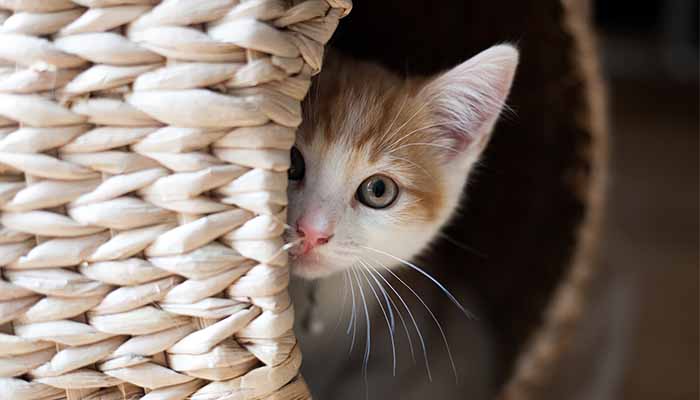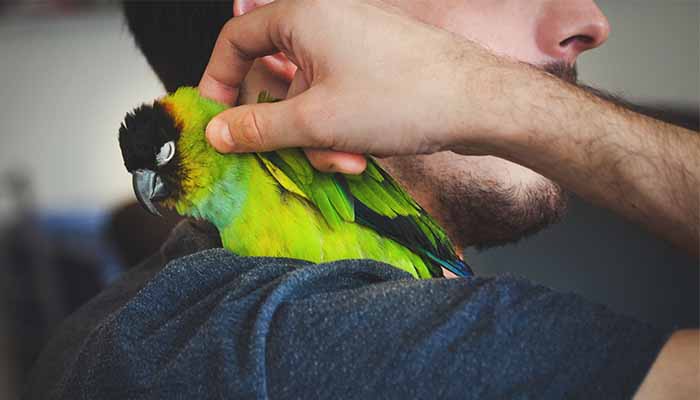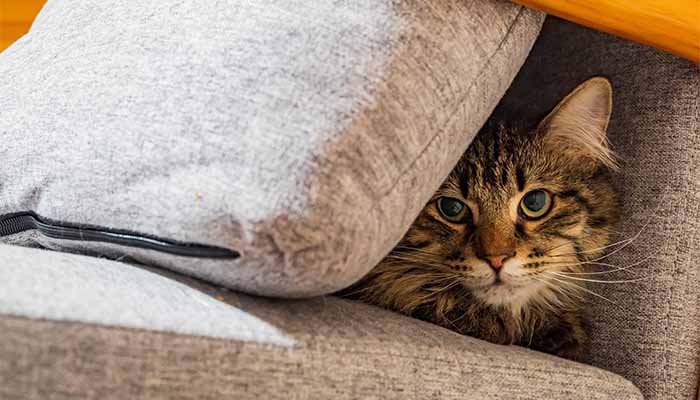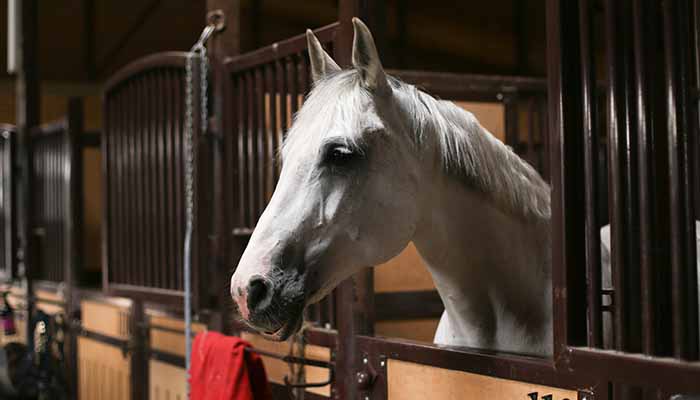Fireworks dazzle the sky during celebrations around the globe, but for our furry companions, they can bring a wave of anxiety.
Unlike other loud sounds they may hear regularly, like thunderstorms, fireworks lack a predictable rhythm which is unsettling for animals. The sudden, loud bangs and bright flashes can be startling and confusing for them.
Dogs have a more acute sense of hearing than humans, making the booms of fireworks seem much louder. While cats are typically more sensitive to new and unexpected stimuli, which can cause heightened anxiety.
Here are some tips to help your pet stay calm and safe during fireworks.
How can I tell if my pet fears fireworks?
Preparing your pets before fireworks
How to keep pets calm and safe during fireworks
A pet-friendly alternative to fireworks
How can I tell if my pet fears fireworks?
Your pet’s reaction to fireworks will vary based on their personality, past experiences, and even their health. Some animals may only show mild signs of discomfort, while others could experience severe stress or panic.
Signs of stress in dogs
- Trembling
- Barking excessively
- Seeking refuge in a hiding spot
- Attempting to escape
- Appearing restless or agitated
- Panting or drooling more than usual

Signs of distress in cats
- Seeking refuge in small, enclosed spaces
- Trembling
- Excessively grooming themselves
- Growling or yowling
- Hissing, swatting, and becoming defensive
Signs of stress in horses
- Pacing and repetitive head movements
- Pawing, kicking or excessively jumpy
- Sweating
- Uncharacteristically aggressive
- Lack of interest in food and water
Signs of stress in small pets
Recognising the signs of distress in smaller pets can be more difficult. Some signs may include:
- Thumping, or stamping their back feet (rabbits and guinea pigs)
- Agitated or quick movements
- Trembling
- Breathing faster
- Freezing or staying unusually still
- Hiding
- Trying to escape
- Teeth grinding
- Change in appetite
- Increased vocalisation (birds)

Preparing your pets before fireworks
Play recordings of fireworks to desensitise pets
Preparation is essential for helping your pet cope with the loud noises of fireworks. Begin by gradually familiarising them with the sounds. Play recordings of fireworks at a low volume while playing, rewarding your pet for their calm behaviour. As they become more comfortable, gradually increase the volume.
Check and update pet ID tags and microchips
Make sure your pet’s identification tags are up to date. If your pet escapes, having up-to-date contact details increases the chances of a quick reunion.
Be aware of local firework displays
While it’s impossible to predict when your neighbour might choose to set off fireworks, it’s a good idea to make a note of any local firework displays. This way, you can adjust your plans and make sure your pet is not home alone.
Use pet calming aids
If your pet tends to feel anxious during fireworks, introduce calming aids to help them relax. Pheromone diffusers can work wonders by releasing soothing scents that mimic the pheromones of mother dogs, creating a comforting environment for your furry friend.
If your cat or dog enjoys feeling secure, an anxiety wrap can provide consistent pressure across their body. This sensation is like a comforting hug and can help ease anxiety.
Calming supplements and anxiety medication for pets
If your pet is particularly sensitive to fireworks, your veterinarian may prescribe medication to help them cope with the stress. These medications can help calm your pet during loud noises and chaotic environments, allowing them to feel more secure.
How to keep pets calm and safe during fireworks
When the fireworks start, it’s important to be there for your pet. Your calm presence can work wonders, giving them reassurance and comfort through the loud bangs and flashes of light.
Tips for keeping dogs calm and safe during fireworks
- Take your dog for a walk to help tire them out before the fireworks start. A well-exercised dog tends to be more relaxed.
- Avoid taking your dog outside during fireworks. It’s best to keep them indoors where they feel safe.
- Close windows, curtains, and blinds, and turn on lights to reduce flashes of lights from the fireworks.
- Respect their hiding instincts. If your dog chooses to hide, allow them to stay in their safe space.
- If your dog reacts fearfully or has an accident, avoid punishing them as this can heighten their anxiety.
- Give your dog any prescribed anxiety medication before the fireworks begin.
- Check that your home and garden are escape-proof. A scared dog may try to flee, so it’s important to create a safe space for them.
Tips for keeping cats calm and safe during fireworks
- During fireworks, it’s best to keep your cats inside at night to prevent them from getting frightened and escaping.
- Make sure your house is escape-proof by closing doors, windows, and cat flaps to limit their access to the outside.
- Do not confine your cat to a small area. They might injure themselves if they try to escape in panic.
- Close curtains and blinds, and turn on the lights to soften any sudden flashes from fireworks.
- Increase the volume on the TV or radio to help drown out the sounds of the fireworks.
- Act normally around your cat. If you start to hover or become overly affectionate, they may sense that something is wrong.
- Set up areas where your cat can retreat, such as high perches or cosy hiding spots, to help them feel secure.

Tips for keeping horses calm and safe during fireworks
- If you keep your horse in a stable overnight, set up the stable as you would on the night of fireworks. E.g. If you plan to have the radio on, keep the top door shut, do this in the weeks leading up to the fireworks.
- Check for any hazards in the stable that could cause injury to your horse if it becomes agitated. Things like protruding screws and nails.
- Have fire extinguishers, sand, and water nearby in case of a fire around the stables.
- If you plan to keep your horse outdoors, check all fencing and gates to prevent the chances of escape.
- Feed your horse before the fireworks begin to distract and give them something to focus on.
- If your horse has shown extreme anxiety during fireworks in the past, speak to your veterinarian about calming supplements or anxiety medications.
- Check on your horse during the evening, or if possible, stay with them. Your presence may have a calming effect.

A pet-friendly alternative to fireworks
Looking for a pet-friendly way to celebrate? How about a laser light show or silent fireworks? Both options paint the night sky with amazing patterns and colours, giving you a stunning display while keeping your pets calm and comfortable.



